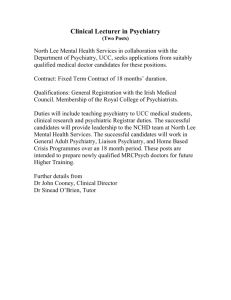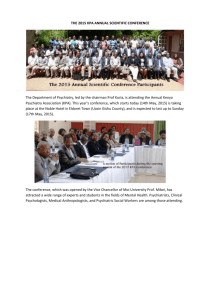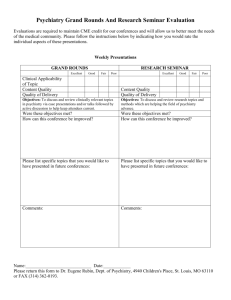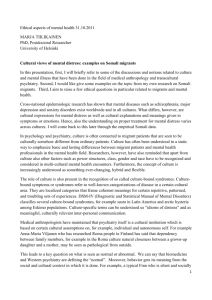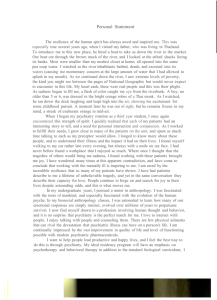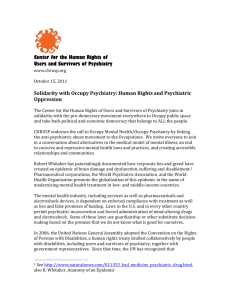Recovery Experts by Experience (REE) Submission to the UN
advertisement
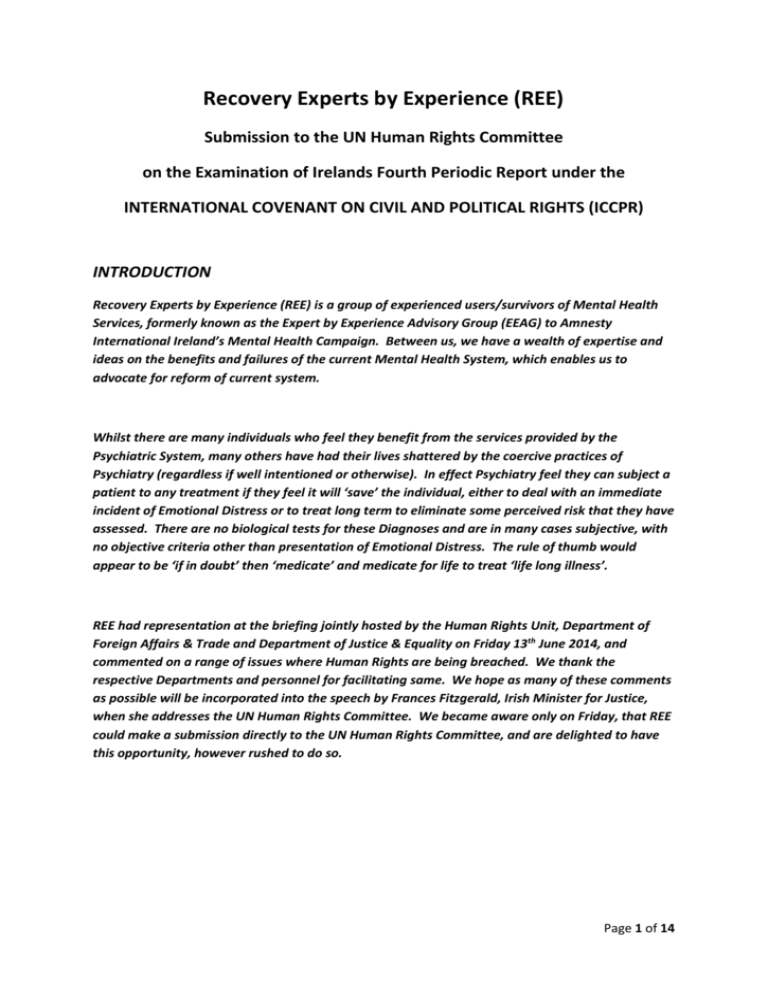
Recovery Experts by Experience (REE) Submission to the UN Human Rights Committee on the Examination of Irelands Fourth Periodic Report under the INTERNATIONAL COVENANT ON CIVIL AND POLITICAL RIGHTS (ICCPR) INTRODUCTION Recovery Experts by Experience (REE) is a group of experienced users/survivors of Mental Health Services, formerly known as the Expert by Experience Advisory Group (EEAG) to Amnesty International Ireland’s Mental Health Campaign. Between us, we have a wealth of expertise and ideas on the benefits and failures of the current Mental Health System, which enables us to advocate for reform of current system. Whilst there are many individuals who feel they benefit from the services provided by the Psychiatric System, many others have had their lives shattered by the coercive practices of Psychiatry (regardless if well intentioned or otherwise). In effect Psychiatry feel they can subject a patient to any treatment if they feel it will ‘save’ the individual, either to deal with an immediate incident of Emotional Distress or to treat long term to eliminate some perceived risk that they have assessed. There are no biological tests for these Diagnoses and are in many cases subjective, with no objective criteria other than presentation of Emotional Distress. The rule of thumb would appear to be ‘if in doubt’ then ‘medicate’ and medicate for life to treat ‘life long illness’. REE had representation at the briefing jointly hosted by the Human Rights Unit, Department of Foreign Affairs & Trade and Department of Justice & Equality on Friday 13th June 2014, and commented on a range of issues where Human Rights are being breached. We thank the respective Departments and personnel for facilitating same. We hope as many of these comments as possible will be incorporated into the speech by Frances Fitzgerald, Irish Minister for Justice, when she addresses the UN Human Rights Committee. We became aware only on Friday, that REE could make a submission directly to the UN Human Rights Committee, and are delighted to have this opportunity, however rushed to do so. Page 1 of 14 ICCPR: Articles 7,9, 10 , 12, 14,24 Detention (Voluntary & Involuntary) in Psychiatric Units or Hospitals A carrot and stick approach is used to ensure compliance to Treatment Regimes. Threat of being given ‘involuntary’ status routinely used if a patient is deemed to be non compliant. From the moment the patient enters Hospital, the typical response of Psychiatry is to pathologize the Emotional Distress of the individual and medicate to eliminate ‘symptoms’. If a given dose does not achieve that, you keep increasing the dose to the maximum permitted, or you change drugs, or prescribe off label in certain cases. The DSM (Diagnostic Statistical Manual of Mental Disorders) now has a Diagnosis for ‘ unresolved Grief’ after two weeks. ‘Oppositional Defiant Disorder’ is now being used regularly in USA, to detain people for political control. Allen Francis, Professor Emeritus, Duke University, who was one of the main people involved in writing the previous edition of DSM has spoken out against many of the changes in the current DSM (article Huffington Post 12/03/2012 ‘DSM - 5 is a Guide, Not a Bible: Simply Ignore Its 10 Worst Changes’ . A clip of Paddy McGowan, now Interim Head of Service User/Family Member & Carer Engagement input for HSE (the State Health Service Executive) , is featured on www.genio.ie . Genio is a Charitable Trust, who receives 50% of its funding from HSE itself, presentation can be seen under Media, Presentations, ‘a Day in the Life’. Paddy talks about what he had to do to get out of a Psychiatric Hospital after ten years, in effect he had to become a ‘Professional Psychiatric Patient’ and lie to get out, as many individuals have to, when reality dawns they will not regain their liberty unless they resort to lying, either claiming ‘symptoms’ have been eliminated, reduced or that the issues that caused the distress in the first place never existed. If compliant you will usually: - - Get your clothes (usually taken away even if ‘voluntary’ for a period until it is ascertained you are ‘compliant’). In some cases patients are given theatre scrubs gear to wear, the Psychiatric Unit in Tallaght Hospital still issues Orange coloured suits, instead of pyjamas, despite having given assurances to a Carer Representative that the practice would discontinue a number of years ago. Allowed phone/technology Get to take walk outside (accompanied or unaccompanied depending on ‘level’ assigned by Psychiatrist) Get to go to coffee shop Get hours out (usually accompanied and where patient has to be ‘signed out’) Get overnight stay at home or days out Page 2 of 14 - SEE YOUR CHILDREN (the fear installed by Psychiatry and other professionals) in individuals where this threat is made openly or indirectly is palpable. If you are seen to be non compliant, penalties can include: - Seclusion Restraint Forced Medication Regimes (including pinning people down and forcibly removing their clothes for depot injections ) Threat of being given ‘involuntary’ status if non compliant Not allowed avail of Occupational Therapy etc. Not allowed or reduced access to Visitors Not allowed make or receive phone calls or limits put in place Not allowed take exercise Not allowed smoke/or buy cigarettes If you are seen to be non responsive to drug therapy: - ECT can be given against individuals wishes (even when family objects). A family has zero say if a patient has Involuntary Status. Regardless, if you have Advance Health Care Directive in place, stating categorically that you never want this form of ‘Treatment’. Regardless of any long term damage to memory and the brain, and the actual trauma itself of being subjected to that treatment. Mary Maddox, of Mindfreedom Ireland (affiliated to Mindfreedom International) has done trojan work around the issues involved in the Human Rights Abuses in prescribing and giving ECT. - You can be held until Psychiatry deems it is unnecessary: Often patients with private health cover (both voluntary & involuntary) who are staying at these facilities are routinely kept until the Health Insurance Cover has run out, i.e. for a six month period, regardless if that means they have no cover for serious medical issues if they subsequently arise during that claim period for their medical insurance. In most cases the patient then has to leave the facility regardless if zero improvement in their Emotional Distress. Medication Most patients whether voluntary or involuntary have very little if any say in their prescribed Medication in these facilities. Usually side effects are not discussed or if they are, they are minimised and patients are not routinely given information like increased suicidal/homicidal thoughts (black box warnings in USA), agitation, Tardive Dyskinesia (a condition involving repetitive, Page 3 of 14 involuntary movements often of the mouth, tongue, facial muscles and upper limbs), Parkinsonism (neurological condition), increased risk of diabetes & heart disease etc. Current research is indicating that prolonged used of anti-psychotic medications are reducing life expectancy compared to peers by up to twenty years. The idea is to medicate until symptoms are eliminated rather than understand the causes of the Emotional Distress and Trauma and what would help alleviate it for a given set of circumstances. The off-label prescribing e.g. anti-psychotic Abilify is approved by FDA for use in adults who do not respond to antidepressants alone, is a worrying trend, and patients are not being given the necessary information to make informed decisions. The indignity of an individual being forced to drop their clothing for a Depot Injection (especially if the disagree with treatment) cannot really be understood unless experienced, particularly if they vehemently disagree with the Diagnosis and Treatment Regime. When accompanied by force, it can only further regarded as inhumane and degrading treatment, which is not appropriate in civilised society. Sometimes the ‘Treatment’ reinforces and exacerbates the Emotional Distress that brought the individual to come in contact with Services in the first place, and sadly many may never recover from that abuse. ON DISCHARGE Often the Sectioning process continues after the individual leaves the ‘Treatment’ Facility , as it may be a condition of discharge that the individual accepts visits from Community Mental Health Nurse or attends a Day Hospital for months afterwards. In particular where the threat of loosing one’s children has arisen, the individual often feels they have no choice but attend even if there are no services on offer they feel will be therapeutic. Essentially the individual cannot in most cases define what services they want and feel will help alleviate distress and help get them put their life together again. Compliance to drug therapy, including depot injections is required or in many cases sectioning will be threatened. The Committee is urged to ask the State Party why most patients have little or no say in the Medications being prescribed, and also why they are not being given the appropriate information to give ‘informed’ consent, where consent is apparently recorded on the patients file? The Committee is urged to ask the State Party when these Human Rights violations of forcibly medicating people, including repeatedly pinning them down to be injected against their will, will be deemed illegal under Irish Law? The Committee is urged to ask the State Party will it compensate individuals in the future who have been forced to take these medications, where life expectancy has been drastically reduced, Page 4 of 14 serious drug induced medical conditions develop, or compensate families where Iatrogenic (drug induced) Suicide happens? (see research of David Healy, an Irish Psychiatrist working in UK who has extensive expertise in this area). www.davidhealy.org Voluntary & Involuntary Patients detained in locked wards. After a country visit to Ireland in 2010 by the European Committee for the Prevention of Torture and Inhuman or Degrading Treatment or Punishment (CPT) it stated: ‘Many so-called ‘voluntary’ patients were in reality deprived of their liberty, they were accommodated in closed units from which they were not allowed to leave and, in at least certain cases, were returned to the hospital if they left without permission. Further, if staff considered it necessary, these patients could also be subjected to seclusion and could be administered medication for prolonged periods against their wishes’. Often ‘voluntary’ wards will be locked or locked on occasions, with security men in situ. Some wards have a mix of voluntary and involuntary patients, so everyone is essentially ‘locked in’. The Committee is urged to ask the State Party why it feels it is appropriate to have ‘Voluntary’ patients in locked wards and what measures it will take to stop this practice? The Committee is urged to ask the State Party why in many cases ‘Voluntary’ patients are deprived of their liberty and freedom of movement whilst staying at these facilities, and in effect treated as ‘involuntary’ patients without the appropriate review mechanisms afforded to those with ‘involuntary’ status. The Committee is urged to ask the State Party why individuals have been detained in High Dependency Units, sometimes even against the recommendations of Nursing Staff, when they are clearly neither a threat to themselves or another person/persons? Individuals detained often with ‘involuntary’ status in Psychiatric Units, when they could receive treatment in the community. The Committee is urged to ask the State Party why in many cases individuals are not allowed to define the services they need and avail of them on a voluntary basis in the Community as they so wish? Page 5 of 14 ICCPR Article 19 Right of individual to define type of services needed The individual should have the right to be able to research and advocate for the type of services/ treatment they want to deal with a given situation. At present if an individual with ‘voluntary’ status disagrees with Treating Psychiatry Team, often a 2nd opinion is called in to rubber stamp the opinion, and the person is promptly given ‘involuntary’ status. Freedom of Choice should be respected and freedom/autonomy to have an opinion regarding what constitutes therapeutic treatment for the individual. Often if a patient expresses a different opinion regarding ‘Treatment’, it is taken as a ‘symptom’ of mental illness, rather than an expression of the individual’s intelligence and autonomy to make their own decisions. Currently there is vigorous debate regarding the dubious nature of many of these Diagnoses and alternative approaches to Emotional Distress, e.g. ‘Hearing Voices Approach’ – v – Schizophrenia (Biomedical Model). Some professionals including, Nurses, Psychologists, Occupational Therapists etc. have trained recently with Jacqui Dillon (featured recently in Documentary On 1, RTE Radio 1, ‘Sounds Mad’) & Rachel Waddingham, along with Service Users (voice hearers), Carers and Advocates, but Psychiatry themselves are not engaging for the most part in these alternative approaches. (see TED talk given on youtube by Eleanor Longden ‘The Voices in my Head’ , Psychologist & Voice Hearer). There is only limited use of Open Dialogue Approach as used in Finland with great success, and very difficult to get Psychiatry to engage in Trialogue Meetings. We would urge the State Party to actively support more holistic approaches, such as that advocated by the Irish Institute of Naturopathic Medicine (IINM) (Suicide Prevention) in Glen of Imaal, Wicklow, set up by Maureen Mulligan. Currently Noreen Murphy in Bantry is trying set up Lisheen’s House Counselling and Therapy Centre. These kind of endeavours currently get zero state funding and are incredibly difficult to get off the ground and run. The Hearing Voices Network is being launched in Ireland, support groups such as the Hearing Voices Group set up in Hill Street Resource Centre in Dublin, Cork, Galway ... are crucial in providing a safe place for people to discuss their concerns and get mutual support. We thank the professionals and other facilitators like Bernie Bushe who give of their time freely. We thank the Schools of Nursing and Midwifery Professor Agnes Higgins, Trinity, Mark Monahan Trinity College, Siobhan Smyth National University of Ireland Galway and Eithne Cusack, HSE and anyone else not specifically named for making the funding available for this training and for opening it for individuals to participate. We thank the Lecturers and staff in University College Cork and the College for facilitating the Critical Voices Network Conference which is unique worldwide and held each year on a tiny budget, allowing a sharing of ideas and approaches towards humane responses to Emotional Distress & Trauma. Individuals like Professor Gail Hornstein, Professor John Read, Jacqui Dillon etc. give their time free to present at the Conference and we are indebted to all concerned to make this happen. We thank Mental Health Reform for providing space for REE to meet. REE currently gets zero funding from any source. The Committee is urged to ask the State Party, that under current legislation, do individuals experiencing Emotional Distress & Trauma , who present themselves in a voluntary capacity to a Page 6 of 14 Hospital, realise they may well be switched to ‘involuntary’ status (albeit with a 2nd opinion that usually rubber stamps original), if they disagree with Treatment proposed? The Committee is urged to ask the State Party what steps will be taken when the Mental Health Act is revised to ensure that the individual detained , has the autonomy to research, define and advocate for the treatment they feel will be therapeutic to them to alleviate Emotional Distress? The Committee is urged to ask the State Party to ensure Service Providers & Psychiatry engage meaningfully with service users/ex service users, to actively seek alternatives to Biomedical Model of dealing with Emotional Distress? ICCPR Articles 2, 9, 10, 12, 19 Advance Health Care Directives (AHCD) The Department of Health recently tagged on Advance Health Care Directive proposals onto proposed Capacity Legislation. There was a Public Consultation Process which most members of our Oireachtas knew nothing about, let alone the General Public. It received little or no media coverage, despite a member of REE contacting almost every programme in RTE (national broadcaster) to try and have the issue debated. Proposals as they stand, plan to exclude those with ‘involuntary’ status from having their AHCD held legally binding, even if made at a time when they have Capacity. There was little take up from Journalists or anyone contacted to air this issue. The State placing a small advertisement in newspapers was clearly insufficient to debate this issue. The Centre for Disability Law & Policy at National University of Ireland, Galway, submitted a detailed proposal, which REE was part of, though we do not endorse some of the organisations who came under the umbrella of that submission, e.g. St Patricks Hospital (where ECT can be given against an individual’s wishes or families wishes for that matter). A member of REE, is 76 years old and has to live with the fear that if she ever experiences a period of Emotional Distress again, she may be given ECT against her expressed wishes. Despite having made an AHCD, stating she doesn’t want ECT ever, current proposals will not respect this. No human being should have to live with that fear, let alone at her stage of life. REE sees no reason why there should be a distinction between AHCD made in relation to Medical Care or Emotional (‘Psychiatric’) Issues. Page 7 of 14 We urge the Committee to clarify from the State Party why it thinks it is appropriate to disregard the will and preferences of individuals, who have made an Advance Health Care Directive (when deemed to have Capacity), specifying that they do not want ECT or any other treatment ? We urge the Committee to ask the State Party why it considers it appropriate to distinguish between Advanced Health Care Directives (made when someone has Capacity ) in respect of general medical issues or issues that relate to Emotional Distress (Mental Health)? We urge the Committee to clarify why there was not a proper campaign to inform citizens regarding Advance Health Care Directives and the proposed exclusion for ‘involuntary’ patients, given that status can be changed almost on a demand basis by Psychiatry? ICCPR: Articles 2, 16, 15 Convention on the Rights of Persons with Disabilities The Committee is urged to ask the State Party to provide details of when it will ratify this Convention? Assisted Decision Making (Capacity) Bill 2013 The Committee is urged to ask the State Party what steps have been taken to ensure that proposed legislation will enhance rights and not lead to a ‘flexible’ ‘see-saw’ concept of functional capacity which would essentially allow Psychiatry continue the practice of almost instant switching from voluntary to involuntary status and vice versa when suits ? The Committee is urged to seek clarification from the State Party regarding when this legislation will be brought before the Oireachtas (Irish Parliament) to facilitate its enactment? A State appointed Decision Maker/Assisted Decision maker should only be as a very last resort. It should be open for the individual patient to have a second opinion of their choice, at every stage of the process. REE is horrified that individuals would be detained on Psychiatric Wards, purely Page 8 of 14 because they have an intellectual disability, and would urge the State Party to address this issue immediately. The Committee is urged to ask the State Party to guarantee that every individual, if they so choose, will have the right to have a family member, friend, peer support person, nominated professional or member of their community to advocate for them, assist with decision making or substitute decision making and that Advanced Health Care Directives (AHCD) will be respected where individuals have specified their will and preference? ICCPR Article 18 RELIGION An individual detained in a Psychiatric Detention Facility should have the right to practice their religion (if any), e.g. attend services when they are provided within the Hospital (accompanied by a Nurse or another if so required, unless there is a very clear risk to life of the individual or another). Individuals are routinely stopped from going to Mass, e.g. in Blanchardstown Hospital, even when nurses are willing and available to accompany them. Sometimes if an individual changes religion, or dispenses with their religion, Psychiatry can interpret this as ‘Mental Illness’, particularly if their family disagrees with their choice. The Committee is urged to ask the State Party to take steps to ensure that individuals deprived of their liberty under the Mental Health Act are free to practice their religion (or have no religion), if they so wish? Articles 2, 9, 14, 16, 17, 19 Challenging Lawfulness of Involuntary Detention or Treatment What steps has the State taken or will they take to ensure that the individual who is deprived of their liberty , where possible, is at the centre of all decisions made in relation to legal proceedings, respecting their rights enshrined in Articles 2, 9, 14, 16, 17, 19 : List of rights which should be respected and given status in law: 1. Right to appoint legal team of choice, rather than from a panel, where solicitor is appointed by Mental Health Commission, and individual has no freedom of choice. 2. Right to write (with legal direction if required) Affidavit for Court, or actively contribute to Affidavit, and to proof read same for accuracy, unless capacity is so diminished that this is clearly not possible. If it is decided individual does not have capacity to contribute to Page 9 of 14 3. 4. 5. 6. 7. 8. 9. 10. 11. 12. 13. proceedings in this way, then the individual should have the right to a 2nd opinion of his/her choice, to challenge this decision. Right to have all legal advice provided to individual in writing, so there is no misunderstanding on either side and any advice given verbally is backed up in hard copy format. Right of individual to have open access to their medical records and to be given in advance of court, copies of sworn Affidavits of Treating Team, so an informed decision regarding the merits of going to Court can be ascertained. Right of the individual to attend Court Hearing, and get appropriate written notification of same within given specified timeframe. Right of individual to have a peer advocate, friend, family member, professional of choice present to support or assist in decision making process , if the individual so desires. Cost of same should be borne by State, given the person has been deprived of their liberty. Right of the individual to give evidence, if he or she so wishes and has the capacity to do so. Right to have access to transcript of Court Hearing. In the case of FW – v – Psychiatry Blanchardstown Hospital (August 2008), there was no Stenographer in Court, or Audio recording, so there is no transcript of court proceedings. Even if there is audio recording (now being used), individuals deprived of their liberty should have access to hard copy of transcript promptly. Clarification of whose responsibility it should be to have a Stenographer present. At the moment individuals, e.g. Garda Doctors who are supposed to be giving independent medical assessment in relation to Section 12 Detentions, do not have to provide sworn Affidavits, as in the case detailed above. Given the potential for abuse, this practice should be reviewed. Right to have Courts maintain accurate summary of documents held on file pertaining to a given case. Right of the individual to appeal Judgement to Higher Court until all remedies exhausted, and have costs of legal representation paid, regardless of means, if their liberty has been deprived, under the Mental Health Act. The threat that an individual deprived of their liberty in such circumstances could be held liable for legal costs to appeal, to whatever higher court is not fair and a breach of their rights. Right of the individual to have the opportunity to have whatever experts /medical witnesses are needed for court to ensure a fair and equitable hearing of case, and for the cost of same to be borne by the State. The individual should have the right to medical review of their choice to challenge the evidence of Treating Team. Individual has the right to anonymity if they so wish, and information which could identify them publicly should not be published as has happened, e.g. FW-v-Psychiatry, Blanchardstown. Evidence of Psychiatry needs to be challenged vigorously in Court, especially when deprivation of liberty is at issue. There needs to be a realisation by the Judiciary, Civil & Political Society that Professionals including Psychiatrists and Clinical Directors, can and sometimes do lie (even under oath in the High Court), and orchestrate situations to give patients ‘involuntary’ status. Gail Hornstein, Professor of Psychology, Author and Lecturer , spoke last year at the CVNI Conference in UCC about some of the research on benefits of drug therapies (quoted and used by Psychiatry) being written in the ‘Marketing Page 10 of 14 Departments’ of Drug companies and this going unchallenged for the most part by either Psychiatry or Academia. 14. There needs to be specified punitive penalties (including imprisonment) detailed in Legislation to send out a very clear message to Professionals, especially Psychiatrists, Lawyers , Tribunal Members and Judges, involved in depriving individuals of their liberty under the Mental Health Act that abuse of the process , will not be tolerated. Psychiatry especially need to understand that they cannot continue to get away with orchestrating situations to get ‘involuntary’ status, regardless if they think they are acting in a patients ‘best interests’. Often the damage inflicted by Psychiatry and the ‘treatment’ is worse then any Emotional Distress or Trauma that brought the individual to engage with Services in the first place. For some individuals disengaging with Psychiatry is necessary to start the process of amalgamating the fragments of their lives, shattered by coercive practices, under the delusion of ‘helping ‘ them. Psychiatry (often unwittingly) has been and is still used both to abuse and cover abuse in Ireland and Internationally, and there is an international Protocol used by elements within Police and Intelligence Services to deliberately cause emotional distress and achieve a Diagnosis, discredit an individual and/or deprive them of their liberty. If it is done cleverly the individual would never be aware and would think they had genuinely become unwell. The various professions of Psychiatry, Legal Profession and the Judiciary need to acknowledge this fact and take appropriate precautions to prevent this type of abuse, when depriving someone of their liberty based solely on manifestation of Emotional Distress. The Committee is urged to ask the State Party if they have taken steps to guarantee that persons deprived of their liberty under the MH Act have access to Effective Legal Remedy, which protects their Human Rights? If not when will they do so? The Committee is urged to ask the State Party when will they take steps to ensure that State Agencies or Third Parties (where care has been subcontracted) will be accountable for forcing individuals or parents (where a child has been detained) into taking Judicial Review or Habeas Corpus Proceedings in the High Court, when there were clearly alternatives available, that don’t involve coercive practices? The Committee is urged to ask the State Party has it taken steps to ensure that the HSE or a third Party does not go to Court behind a mother (or fathers back), to get a court order to start psychiatric medication, without advising the Mother (or father) of a Court Date, so she (he) could either represent herself (himself) or have legal representation in Court ,and then effectively propel the Mother (Father) into taking Judicial Review (ex parte) proceedings in the High Court? (Ref Case ‘ A minor – v – Clinical Director St. Loman’s Hospital Mullingar 2013). The Committee is urged to ask the State Party when it will appoint an Ombudsperson to deal with complaints and avoid the huge Financial and Emotional cost of dragging individuals (who are already often in Emotional Distress) through the Court System? Page 11 of 14 Articles 2, 9, 16 Right to Medical Records At present it is often difficult if not impossible to obtain records, even under Freedom of Information provisions. Usually Psychiatry will state that it is not in a patients ‘best interests’ or ‘could be detrimental to their mental state’ to allow access. Third party records, although they may have been used to incarcerate an individual, will not be given, even if a complaint arises or the individual wishes to pursue legal remedy. The Committee is urged to ask the State Party, when individuals will be able to legitimately ask and receive their ‘Psychiatric’ Medical Records. If Psychiatry can stand over their Diagnoses and Treatment, they should be able to share this information with the individuals who have been on the receiving end of their ‘Treatment’. COMMENT ON STATE FUNDED RESEARCH Much of Government funded research in terms of ‘Mental Health’ and ‘Mental Illness’ is being focused around the concept of viewing Emotional Distress & Trauma as ‘brain disorders’ . There is zero debate and Media Coverage around the use of Electromagnetic Radiation/Pulsed Frequencies/Microwave Technology (including microwave auditory effect), passive (broadband, Wifi) and malicious exposure, and the effect of that on the brain. The Irish Environmental Doctors Association invited Barrie Trower to Ireland to present last year on the health effects of this Technology. The research of Andrew Lai, University of Washington, Andrew Goldsworthy (Imperial College London), Olle Johansson, Karolinksa Institue references the effect of Electromagnetic Radiation on the brain, including crossing of the blood/brain barrier and single and double strand breaks in DNA, i.e. Genetic Mutation. Currently Government Research would appear to be directed towards seeing mental illness as a brain ‘disorder’ and finding Biomarkers. A broader investigation of Environmental Factors effecting the brain needs to be considered. Emotional Distress & Trauma are not inherited brain disorders , in most cases it is a legitimate response to a given situation, and the resources one has to deal with that. Again key stakeholders like service users, ex service users, families and carers have zero say in how Government funding is being allocated. Funding and Page 12 of 14 research into what peer support mechanisms need to be in place as well as research done by individuals like Gail Hornstein, Professor of Psychology needs to be facilitated and prioritised. We need an approach which reflects our humanity, not dissects the brain. CONCLUSION REE would like to acknowledge the positive development HSE (Health Service Executive) has made in appointing Paddy McGowan as the interim Head of Service, Family Member & Carer Engagement. We would hope his appointment will be made permanent in the near future and have the necessary funding to engage meaningfully with key stake holders, to ensure HSE’s compliance with Human Rights obligations. Recovery Experts by Experience (REE) would like to acknowledge the work done by IHRC, ICCL , in making submissions which include recommendations on the area of ‘Mental Health Care’ and hope to work more closely with these organisations and Government Departments in the future, towards the recognition and upholding of Human Rights within Psychiatry and the Care System in Ireland. We thank Amnesty International, for the Support previously given, when funding was available. We would ask the State Party to ensure the necessary funding to have the appropriate mechanisms and funding in place for these organisations and the Mental Health Commission to ensure effective compliance with the provisions laid down in the ICCPR. We would like the Irish Government, in particular Kathleen Lynch, Minister of State, Department of Health & Justice... with responsibility for Disability, Older People, Equality & Mental Health, James Reilly, Minister for Health & Frances Fitzgerald , Minister for Justice & Equality to ensure that the voices of ‘lived experience’ be heard at the table at each and every stage of reform endeavours, and not the token representation (as on the current review of the Mental Health Act 2001 ). For all future reviews, inputs to changes in Legislation, etc. we respectfully suggest that a 50/50 representation would be more appropriate if the Paradigm shift which is clearly required in Psychiatry is ever to be achieved. We would hope to have a role in reporting and monitoring the State Party’s response to the Concluding Observations by the UN Committee on Human Rights, to ensure the voice of key stakeholders is heard and Human Rights upheld. REE has drawn upon the work of Tina Minkowitz, Attorney and Co-drafter of Convention on the Rights of Persons with Disabilities (CRPD) tminkowitz@earthilnk.net, President, Center for the Human Rights of Users and Survivors of Psychiatry (www.chrusp.org). International Representative, World Network of Users and Survivors of Psychitatry (www.wnusp.net ). Tina has worked relentlessly to shift the current paradigm around the areas of legal capacity, liberty and respect for integrity of the person and uphold Human Rights. REE acknowledges the Advocacy and ongoing support of Eilionoir Flynn and the Centre for Disability Law & Policy (CDLP), National University of Ireland, Galway (NUI Galway) in the tremendous work they do to keep Human Rights to the forefront of the Cultural and Political Agenda in Ireland, particularly around their work for advocating for CRPD-compliant Capacity Legislation and to have Advance Directives legally binding. Page 13 of 14 We thank the UN Human Rights Committee and Secretariat (Kate Fox) for affording us the opportunity to make this submission and have our voice heard, something we have found very difficult to do within our State Mechanisms. Dated June 2014 Recovery Experts by Experience (REE) C/O 14 Chesterfield View Castleknock Dublin 15 Tel: 087 2367365 Landline +353 1 8223130 Email: hazel.larkin@gmail.com Email: fionamwalsh@live.ie Page 14 of 14



